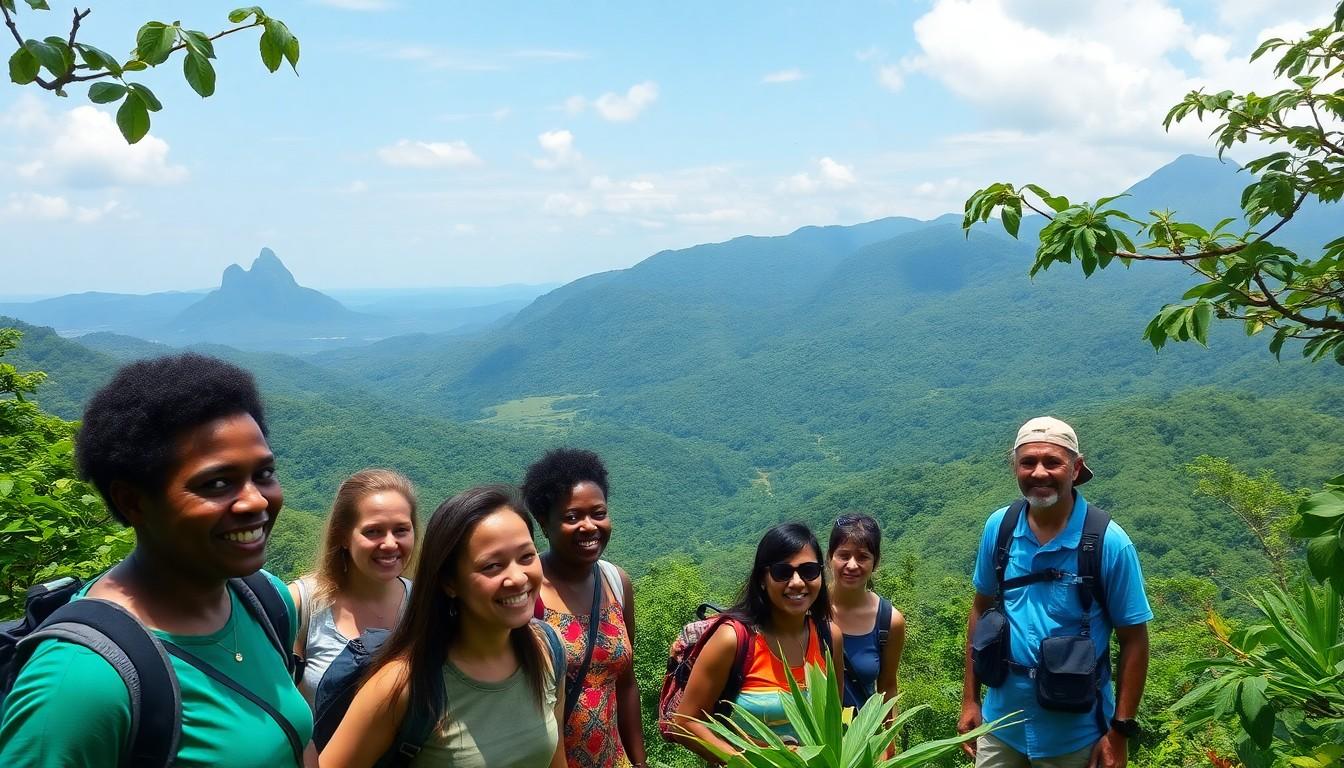Imagine a place where lush rainforests meet stunning coastlines, and every step you take helps protect the environment. Welcome to Jamaica, the island that’s not just about reggae and rum but also a haven for eco-tourism enthusiasts. Here, travelers can dive into crystal-clear waters, hike through vibrant jungles, and sip on the freshest coconut water—all while treading lightly on the planet.
Eco Tourism Jamaica
Eco-tourism in Jamaica highlights the island’s commitment to preserving its natural beauty while providing unique travel experiences. Visitors explore lush rainforests, breathtaking waterfalls, and pristine coastlines. Many eco-lodges and resorts prioritize sustainability, using renewable energy and supporting local communities.
Diverse activities cater to both adventure seekers and nature enthusiasts. Hiking through the Blue Mountains offers stunning views and opportunities to encounter native flora and fauna. Snorkeling and diving at coral reefs reveal vibrant underwater ecosystems, making marine exploration a key attraction.
Education plays a vital role in eco-tourism efforts. Guided tours often focus on the ecological significance of various habitats, fostering awareness and appreciation among visitors. Partnerships with local conservation groups ensure sustainable practices are maintained.
Jamaica’s wildlife diversity enriches eco-tourism experiences. Birdwatchers revel in spotting endemic species, such as the Jamaican Tody or the Red-billed Streamertail. Other opportunities for observing wildlife exist at protected areas like the Blue and John Crow Mountains National Park.
Cultural exchanges enhance the eco-tourism experience by connecting travelers with local traditions and practices. Culinary tours featuring organic produce and traditional cooking create immersive adventures. Music and art events showcasing local talent further deepen visitors’ understanding of Jamaican culture.
Every initiative within Jamaica’s eco-tourism sector aims to support environmental preservation and community development. Sustainability remains central to Jamaica’s attractions, ensuring the island retains its natural charm for generations to come. Travelers can engage meaningfully with the environment while enjoying unforgettable moments in this tropical paradise.
Benefits of Eco Tourism in Jamaica

Eco-tourism in Jamaica benefits both the environment and local communities through sustainable practices and unique experiences. Participants engage with nature while supporting conservation efforts that protect the vibrant ecosystems of the island.
Environmental Conservation
Eco-tourism promotes environmental conservation, fostering a deep respect for Jamaica’s stunning landscapes. Visitors contribute to the preservation of biodiversity, particularly in protected areas like the Blue and John Crow Mountains National Park. Through guided tours and educational experiences, travelers learn about the ecological significance of native species, including endemic birds. Many eco-lodges implement renewable energy sources and waste management practices, minimizing their impact on nature. Partnerships with local conservation groups strengthen conservation initiatives, ensuring a collective effort toward sustainability.
Economic Growth
Eco-tourism fuels economic growth within local Jamaican communities. Employment opportunities arise from eco-lodges, guided tours, and cultural experiences that attract tourists seeking sustainable travel options. Revenue generated from eco-tourism supports local businesses, including artisans and farmers. As more travelers prioritize ecological practices, investments in infrastructure improve, further benefiting the economy. By combining environmental sustainability with economic development, Jamaica’s eco-tourism sector establishes a model for balanced growth. Growth reinforces community involvement, ensuring that locals share in the benefits of their natural heritage while safeguarding it for future generations.
Popular Eco Tourism Destinations
Jamaica offers a variety of eco-tourism destinations that highlight its natural beauty and commitment to sustainability. Each location provides unique experiences for those interested in exploring the island’s vibrant ecosystems.
Blue Mountains
Blue Mountains stand as a premier eco-tourism destination. Home to lush rainforests and diverse wildlife, this area attracts nature lovers and adventure seekers alike. Hiking trails lead to stunning vistas, allowing visitors to experience breathtaking views. The area also produces world-class coffee, with plantations available for tours emphasizing sustainable cultivation practices. Birdwatchers find delight in spotting numerous endemic species, enhancing their connection to nature.
Negril’s Seven Mile Beach
Negril’s Seven Mile Beach boasts pristine sands and crystal-clear waters. Activities such as snorkeling reveal vibrant coral reefs teeming with marine life. Local eco-lodges prioritize sustainability, incorporating renewable energy sources and locally sourced materials. Engaging in beach cleanups supports community efforts to maintain the area’s natural beauty. Culinary experiences highlight farm-to-table initiatives, connecting visitors to local farmers and their sustainable practices.
Ocho Rios
Ocho Rios serves as a hub for eco-tourism experiences in Jamaica. Visitors can explore stunning waterfalls and lush botanical gardens that showcase indigenous plant species. Adventure activities include zip-lining through the treetops, providing an exhilarating way to appreciate the natural surroundings. Educational tours focus on conservation efforts, collaborating with local organizations to promote environmental awareness. Cultural experiences, such as community craft markets, highlight local artisans and sustainable art practices, enriching visitors’ understanding of Jamaican culture.
Activities to Experience
Jamaica offers a wide range of eco-tourism activities that immerse visitors in its natural beauty. Adventurers and nature lovers alike find plenty to explore.
Hiking and Nature Trails
Travelers enjoy hiking the Blue Mountains’ diverse trails, showcasing stunning vistas and unique flora. Many paths wind through lush rainforests, offering encounters with exotic plants and birds. Experienced guides provide insights into local ecosystems. Explore trails like the Blue Mountain Peak Trail for a challenging climb, or take the easier Cinchona Gardens Trail for leisurely strolls. Each hike emphasizes the importance of conservation, allowing participants to appreciate the island’s environmental treasures fully.
Wildlife Tours
Wildlife tours provide opportunities to observe Jamaica’s vibrant biodiversity. Many tours include visits to the Blue and John Crow Mountains National Park, known for endemic bird species like the Jamaican Tody. Tour guides share knowledge on local wildlife and conservation efforts. Boat trips along the coast also expose visitors to marine life such as dolphins and colorful fish. Engaging with knowledgeable locals enriches the experience, highlighting the ecological significance of preserving habitats.
Sustainable Accommodations
Sustainable accommodations play a crucial role in eco-tourism. Many eco-lodges prioritize environmentally-friendly practices, like using renewable energy and sourcing food locally. Visitors can choose from options like The Jamaica Inn or The Half Moon, both committed to sustainability. These lodgings not only offer comfort but also support community initiatives. Guests often participate in local projects, gaining a deeper understanding of Jamaican culture and traditions. Staying in sustainable accommodations enhances the travel experience, aligning personal enjoyment with environmental responsibility.
Challenges and Considerations
Eco-tourism in Jamaica presents several challenges that require careful planning and management. Understanding the ecological impact and community engagement aspects of eco-tourism is essential for fostering a sustainable future.
Ecological Impact
Impacts on ecosystems can arise from increased visitor numbers. Messy littering and habitat disruption pose significant threats to Jamaica’s unique flora and fauna. Striking a balance between tourism and conservation remains critical for preserving biodiversity. Visitors unintentionally contribute to soil erosion with their activities and traffic to fragile areas. Protecting sensitive environments necessitates strict guidelines for tourists and operators alike. Implementing educational programs helps convey the importance of conservation. Such initiatives emphasize minimizing footprints in natural spaces to enhance preservation. Sustainable practices within accommodations and tour operations also play a role in mitigating negative effects.
Community Engagement
Engagement with local communities is vital for successful eco-tourism in Jamaica. Local stakeholders must actively participate in decision-making processes regarding tourism developments. Promoting cultural heritage fosters a sense of pride and ownership among residents. Integrating community-led programs ensures that economic benefits reach the people most affected by tourism. Tourists gain enriched experiences through interactive cultural exchanges, such as artisanal workshops and culinary tours. Collaborating with local organizations enhances the reach and effectiveness of conservation efforts. Fostering partnerships between eco-tourism operators and communities also helps create long-term sustainable solutions. Prioritizing community voices leads to more inclusive practices that benefit both residents and visitors.
Jamaica’s Natural Charm
Jamaica stands out as a remarkable eco-tourism destination that beautifully marries adventure with sustainability. Its diverse landscapes and rich cultural heritage offer travelers unique experiences that foster a deeper appreciation for nature. By choosing eco-friendly activities and accommodations, visitors not only enjoy the island’s stunning beauty but also contribute to its preservation.
The commitment to environmental protection and community engagement ensures that Jamaica’s natural charm remains intact for future generations. As eco-tourism continues to grow, it paves the way for a sustainable future that benefits both the environment and local communities. Exploring Jamaica through an eco-tourism lens is not just a trip; it’s a chance to be part of a movement that values and protects the island’s extraordinary ecosystems.

